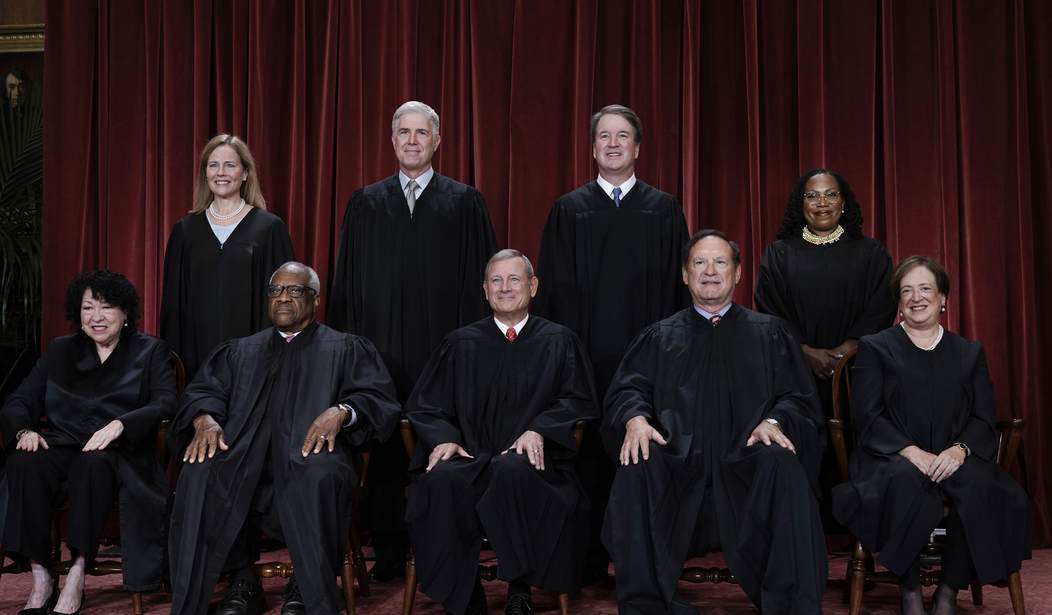In Monday morning's Morning Musing, I remarked: "I expect we'll see an order or two out of the Supreme Court this week on the pending applications for stay before it." Right on cue, the court has issued an order in the case styled Noem v. Vasquez-Perdomo, involving the Trump administration's immigration enforcement efforts in Los Angeles, California.
In July, California District Court Judge Maame Ewusi-Mensah Frimpong (a Biden appointee) issued a sweeping temporary restraining order (TRO), ruling that the enforcement actions taken by Immigration and Customs Enforcement (ICE) were unconstitutional and imposing significant restrictions on the standards ICE agents could use to establish "reasonable suspicion" to stop and question suspected illegals. The administration appealed the district court order to the 9th Circuit, and, from there, filed an application for stay with the Supreme Court.
READ MORE: Another Day, Another Temporary Restraining Order—CA Judge Kneecaps ICE Efforts in Golden State
Trump Administration Appeals Totally Improper Ruling by Rogue California Judge to Supreme Court
Now, in a 6-3 decision, the Supreme Court has granted the application for stay.
BREAKING: A 6-3 Supreme Court ALLOWS the Trump administration to resume sweeping immigration raids in Los Angeles without probable cause https://t.co/ilduM9LPSq pic.twitter.com/yI7MfOh4p2
— Jacob Wheeler (@JWheelertv) September 8, 2025
The primary order is Per Curiam, but Justice Brett Kavanaugh authored a concurrence. Justice Sonia Sotomayor authored a dissent, in which Justices Elena Kagan and Ketanji Brown Jackson joined.
Kavanaugh's concurrence is brief (less than 10 pages), but makes several key points:
To be sure, I recognize and fully appreciate that many (not all, but many) illegal immigrants come to the United States to escape poverty and the lack of freedom and opportunities in their home countries, and to make better lives for themselves and their families. And I understand that they may feel somewhat misled by the varying U.S. approaches to immigration enforcement over the last few decades. But the fact remains that, under the laws passed by Congress and the President, they are acting illegally by remaining in the United States—at least unless Congress and the President choose some other legislative approach to legalize some or all of those individuals now illegally present in the country. And by illegally immigrating into and remaining in the country, they are not only violating the immigration laws, but also jumping in front of those noncitizens who follow the rules and wait in line to immigrate into the United States through the legal immigration process. For those reasons, the interests of illegal immigrants in evading questioning (and thus evading detection of their illegal presence) are not particularly substantial as a legal matter.
...
Especially in an immigration case like this one, it is also important to stress the proper role of the Judiciary. The Judiciary does not set immigration policy or decide enforcement priorities. It should come as no surprise that some Administrations may be more laissez-faire in enforcing immigration law, and other Administrations more strict. Article III judges may have views on which policy approach is better or fairer. But judges are not appointed to make those policy calls. We merely ensure, in justiciable cases, that the Executive Branch acts within the confines of the Constitution and federal statutes. Just as this Court a few years ago declined to step outside our constitutionally assigned role to improperly compel greater Executive Branch enforcement of the immigration laws, see United States v. Texas, 599 U. S. 670; Biden v. Texas, 597 U. S. 785, we now likewise must decline to step outside our constitutionally assigned role to improperly restrict reasonable Executive Branch enforcement of the immigration laws. Consistency and neutrality are hallmarks of good judging, and in my view, we abide by those enduring judicial values in this case by granting the stay.
As with so many of these cases, this ruling isn't the end of the inquiry — though it's unquestionably a win for the administration. It places a hold on the district court's TRO while the case works its way through the process on the merits. RedState will continue to follow the case and report on any notable developments.
Editor's Note: The headline of this article was updated post-publication to reflect that the ruling pertains to immigration-related "stops," rather than "raids."
Editor’s Note: Do you enjoy RedState’s conservative reporting that takes on the radical left and woke media? Support our work so that we can continue to bring you the truth.
Join RedState VIP and use the promo code FIGHT to get 60% off your VIP membership!















Join the conversation as a VIP Member